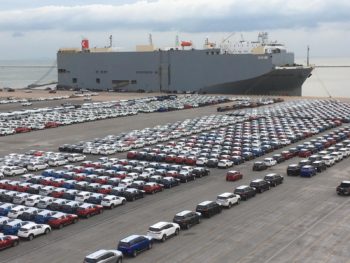Fleet sales fall 7.3% in 2018 while new car emissions rise
Both fleet and overall UK new car registrations fell in 2018 while continued anti-diesel policies caused new car CO2 to rise for the second successive year.
That’s according to figures released today by the Society of Motor Manufacturers and Traders (SMMT), which says that the data is a wake-up call to policymakers as environmental calls are at risk.
Private, fleet and business registrations all fell in 2018, with the biggest losses felt in the fleet sector (down 7.3%). Private and smaller business operator registrations were down 6.4% and 5.6% respectively. UK new car registrations as a whole fell 6.8% in 2018 to 2.37m units.
This comes on the back of a 7.9% downturn in fleet registrations for December, while private registrations were down 3.8% and sub-25 business registrations rose by 16.8%. Overall December registrations fell 5.5%.
Looking at vehicle types, 2018 registrations fell across all segments bar the dual purpose category, which grew by +9.1% to take a fifth of the market (21.2%). Despite registrations of superminis and lower medium cars falling by 2.5% and 9.4% respectively, these smaller vehicles remain the most popular – with a combined 58.7% market share.
Within the fuel types categories, the biggest volume decline was seen in the diesel sector, down 29.6% in 2018, with the volume loss equivalent to some 180% of the overall market’s decline. Growth in registrations of petrol (+8.7%) and alternatively fuelled vehicles (+20.9%) helped compensate but was not enough to offset the diesel downturn.
The SMMT data also showed that the move away from diesels has had a significant impact on the UK new car fleet average CO2, which was up for the second year running with a 2.9% increase to 124.5g/km. In a statement, the association said the downturn in CO2 as a result of diesel efficiencies – diesels are, on average, 15-20% more efficient than petrol equivalents – was being undermined by the shift to petrol and disappointing take-up of AFVs. The SMMT added that customer migration to different segment vehicles and the move to the new WLTP test, which produces higher figures, had impacted CO2, albeit on a smaller scale to the shift away from diesels.
The increase in CO2 will not only impact on carmakers trying to meet emission targets but will also have an impact on government climate change targets.
Mike Hawes, SMMT chief executive, said: “The industry is facing ever-tougher environmental targets against a backdrop of political and economic uncertainty that is weakening demand so these figures should act as a wake-up call for policy makers. Supportive, not punitive measures are needed to grow sales, because replacing older cars with new technologies, whether diesel, petrol, hybrid or plug-in, is good for the environment, the consumer, the industry and the exchequer.”













